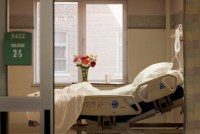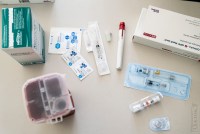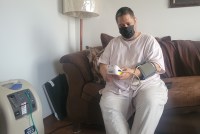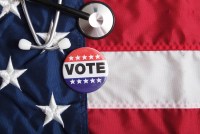Latest KFF Health News Stories
The Politics Holding Back Medicaid Expansion in Some Southern States
Ten states have not expanded Medicaid, leaving 1.5 million people ineligible for the state and federal insurance program and also unable to afford private insurance. Seven of those states are in the South, where expansion efforts may have momentum but where lawmakers say political polarization is holding them back.
The Nation’s 911 System Is on the Brink of Its Own Emergency
911 outages have hit at least eight states this year. They’re emblematic of problems plaguing emergency response communications due in part to wide disparities in capabilities and funding.
Investigan si los armadillos son responsables de la propagación de la lepra en Florida
La región central de Florida es un foco crítico de esta antigua enfermedad, lo que desconcierta a los científicos que están analizando el fenómeno.
The Case of the Armadillo: Is It Spreading Leprosy in Florida?
A single Central Florida county reported 13% of all U.S. leprosy cases in 2020. Researchers have teamed up to investigate whether armadillos are passing the bacteria that cause the disease to humans — which is especially concerning as the animals expand their range farther north.
Tribal Nations Invest Opioid Settlement Funds in Traditional Healing To Treat Addiction
Hundreds of Native American tribes are getting money from settlements with companies that made or sold prescription painkillers. Some are investing it in sweat lodges, statistical models, and insurance-billing staffers.
What Florida’s New 6-Week Abortion Ban Means for the South, and Traveling Patients
Florida has served as a haven for Southern pregnant women with little or no access to abortions. But the Florida Supreme Court upheld a six-week abortion restriction that begins in May — so now women across much of the South seeking abortions will have to look farther afield.
Conservative Justices Stir Trouble for Republican Politicians on Abortion
Republicans are learning the admonition “be careful what you wish for,” as conservative judges cause them political problems over abortion in a crucial election year.
Becerra Joins the Fray Over Reproductive Rights
Health and Human Services Secretary Xavier Becerra is racking up frequent-flier miles as he hopscotches the country to highlight health issues the White House hopes will become pivotal for voters this year — none more so than reproductive rights. “No woman today should fear [not having] access to the care that she needs. President Biden […]
City-Country Mortality Gap Widens Amid Persistent Holes in Rural Health Care Access
People in their prime working years living in rural America are 43% more likely to die of natural causes, like diseases, than their urban counterparts, a disparity that grew rapidly in recent decades, according to a new federal report.
Readers Speak Up About Women’s Health Issues, From Reproductive Care to Drinking
KFF Health News gives readers a chance to comment on a recent batch of stories.
Feds Join Ranks of Employers with Generous Fertility Benefits
Starting this year, federal employees can choose plans that cover a broad menu of fertility services, including up to $25,000 annually for in vitro fertilization procedures. At the same time, politics around IVF and reproductive health have become a central issue in the current election-year debate.
What the Health? From KFF Health News: The Supreme Court and the Abortion Pill
The Supreme Court this week heard its first abortion case since overturning Roe v. Wade in 2022, about an appeals court ruling that would dramatically restrict the availability of the abortion pill mifepristone. But while it seems likely that this case could be dismissed on a technicality, abortion opponents have more challenges in the pipeline. Meanwhile, health issues are heating up on the campaign trail, as Republicans continue to take aim at Medicare, Medicaid, and the Affordable Care Act — all things Democrats are delighted to defend. Alice Miranda Ollstein of Politico, Sarah Karlin-Smith of the Pink Sheet, and Lauren Weber of The Washington Post join KFF Health News chief Washington correspondent Julie Rovner to discuss these issues and more. Also this week, Rovner interviews KFF Health News’ Tony Leys, who wrote a KFF Health News-NPR “Bill of the Month” feature about Medicare and a very expensive air-ambulance ride. Plus, for “extra credit,” the panelists suggest health policy stories they read this week they think you should read, too.
California Is Expanding Insurance Access for Teenagers Seeking Therapy on Their Own
A California law that takes effect this summer will grant minors on public insurance the ability to get mental health treatment without their parents’ consent, a privilege that their peers with private insurance have had for years. But the law has become a flashpoint in the state’s culture wars.
Adolescentes podrían ir al psicólogo sin tener el permiso de sus padres
Según la nueva ley en California, los jóvenes podrán hablar con un terapeuta sobre la identidad de género sin el consentimiento de sus padres. Pero no podrán recibir tratamiento residencial, medicación o cirugía de afirmación de género sin el visto bueno de sus padres, como han sugerido algunos opositores.
Covid and Medicare Payments Spark Remote Patient Monitoring Boom
Demand for help monitoring patients’ vital signs remotely has taken off since a Medicare change in 2019. Dozens of companies now push the service to help overburdened primary care doctors — and as a revenue stream. But some policy experts say its growth has outpaced oversight and evidence of effectiveness.
A New Orleans Neighborhood Confronts the Racist Legacy of a Toxic Stretch of Highway
New federal funds aim to address an array of problems created by highway construction in minority neighborhoods. These are economic, social, and, perhaps above all, public health problems. In New Orleans’ Treme neighborhood, competing plans for how to deal with harm done by the Claiborne Expressway reveal the challenge of how to mitigate them meaningfully.
What the Health? From KFF Health News: The State of the Union Is … Busy
At last, Congress is getting half of its annual spending bills across the finish line, albeit five months after the start of the fiscal year. Meanwhile, President Joe Biden delivers his annual State of the Union address, an over-the-counter birth control pill is (finally) available, and controversy erupts over new public health guidelines for covid-19 isolation. Alice Miranda Ollstein of Politico, Sarah Karlin-Smith of the Pink Sheet, and Sandhya Raman of CQ Roll Call join KFF Health News’ Julie Rovner to discuss these issues and more. Also this week, Rovner interviews Neera Tanden, the White House domestic policy adviser, about Biden’s health agenda. Plus, for “extra credit,” the panelists suggest health policy stories they read this week that they think you should read, too.
Statistical Models vs. Front-Line Workers: Who Knows Best How to Spend Opioid Settlement Cash?
A mathematical model designed to direct spending of opioid settlement funds is at the center of a debate over whether to invest in technology to guide long-term decisions or focus on the immediate needs of people in addiction.
America Worries About Health Costs — And Voters Want to Hear From Biden and Republicans
The presidential election is likely to turn on the simple question of whether Americans want Donald Trump back in the White House. But health care tops the list of household financial worries for adults from both parties.
What the Health? From KFF Health News: Alabama’s IVF Ruling Still Making Waves
Lawmakers in Congress and state legislatures are scrambling to react to the ruling by the Alabama Supreme Court that frozen embryos created for in vitro fertilization are legally children. Abortion opponents are divided among themselves, with some supporting full “personhood” for fertilized eggs, while others support IVF as a moral way to have children. Rachel Cohrs of Stat, Riley Griffin of Bloomberg News, and Joanne Kenen of the Johns Hopkins University schools of nursing and public health and Politico Magazine join KFF Health News’ Julie Rovner to discuss these issues and more. Also this week, Rovner interviews University of Pittsburgh law professor Greer Donley, who explains how a 150-year-old anti-vice law that’s still on the books could be used to ban abortion nationwide. Plus, for “extra credit,” the panelists suggest health policy stories they read this week that they think you should read, too.






















